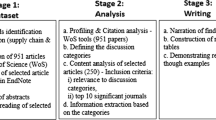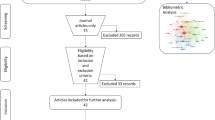Abstract
Platform-based capacity sharing is a new business format of sharing economy to reallocate spare production resources via industrial internet, generating collaborative manufacturing related platform operations issues. This paper examines the impact of cross-network externality and supply risk of the two-sided market on the pricing and blockchain adopting decisions of capacity sharing platforms. The mean–variance model is employed to depict the impact of purchasers’ or suppliers’ risk-sensitive types on platform pricing, where purchasers’ or suppliers’ risk-sensitive types can be identified by blockchain technology and be intertwined by the cross-network externality. The obtained platform’s optimal pricing under two scenarios with risk-sensitive capacity purchasers (D) and risk-sensitive suppliers (S) shows that the platform charges risk-seeking, risk-neutral and risk-averse users in descending order for the platform side containing risk-sensitive users, regardless of the comparison of bilateral cross-network externalities. However, for risk-neutral side users, the price ranking under three risk-sensitive types depends on the relative size of bilateral cross-network externalities. In addition, blockchain technology always decreases the surplus of risk-sensitive side users, whereas it increases the surplus of risk-insensitive side users. Further, we find that platform prefers to introduce blockchain technology when the fixed cost of introducing it is less than the profit increment it brings. In addition, by comparing platform profits and blockchain value in the two scenarios, we argue that platforms need to comprehensively balance the comparison of fixed costs of introducing blockchain on both sides and the importance of risk-preferring and risk-averse users to improve their profitability. Introducing blockchain technology to the side where the cost of blockchain technology is higher may result in higher blockchain value for the platform. Finally, we examine the platform with two-sided risk-sensitive users and the results are robust. This study proposes theoretical explanation for platform pricing considering the cross-network externality and risk-sensitive users, as well as some management insights for the application of blockchain technology in platform operations.






Similar content being viewed by others
Change history
29 March 2024
A Correction to this paper has been published: https://doi.org/10.1007/s10479-024-05953-2
References
Akter, S., Michael, K., Uddin, M. R., & McCarthy, M. R. (2020). Transforming business using digital innovations: The application of ai, blockchain, cloud and data analytics. Annals of Operations Research, 308(1–2), 7–39.
Anderson, E. G., Parker, G. G., & Tan, B. (2014). Platform performance investment in the presence of network externalities. Information Systems Research, 25(1), 152–172.
Armstrong, M. (2006). Competition in two-sided markets. The Rand Journal of Economics, 37(3), 668–691.
Bakos, Y., & Halaburda, H. (2020). Platform competition with multihoming on both sides: Subsidize or not? Management Science, 66(12), 5599–5607.
Behl, A., Sampat, B., Pereira, V., Jayawardena, N. S., & Laker, B. (2023). Investigating the role of data-driven innovation and information quality on the adoption of blockchain technology on crowdfunding platforms. Annals of Operations Research. https://doi.org/10.1007/s10479-023-05290-w
Belleflamme, P., & Peitz, M. (2019). Platform competition: Who benefits from multihoming? International Journal of Industrial Organization, 64, 1–26.
Cai, Y.-J., Choi, T.-M., & Zhang, J. (2020). Platform supported supply chain operations in the blockchain era: Supply contracting and moral hazards*. Decision Sciences, 54(2), 866–892.
Charles, V., Emrouznejad, A., & Gherman, T. (2023). A critical analysis of the integration of blockchain and artificial intelligence for supply chain. Annals of Operations Research, 327(1), 7–47
Chen, M., Xia, Y, & Wang X. (2010). "Managing supply uncertainties through bayesian information update." IEEE Transactions on Automation Science & Engineering, 7(1), 24–36.
Choi, T.-M. (2019). Blockchain-technology-supported platforms for diamond authentication and certification in luxury supply chains. Transportation Research Part E: Logistics and Transportation Review, 128, 17–29.
Choi, T.-M. (2022). Achieving economic sustainability: Operations research for risk analysis and optimization problems in the blockchain era. Annals of Operations Research. https://doi.org/10.1007/s10479-021-04394-5
Choi, T.-M., Feng, L., & Li, R. (2020a). Information disclosure structure in supply chains with rental service platforms in the blockchain technology era. International Journal of Production Economics, 221, 107473.
Choi, T.-M., Guo, S., Liu, N., & Shi, X. (2020b). Optimal pricing in on-demand-service-platform-operations with hired agents and risk-sensitive customers in the blockchain era. European Journal of Operational Research, 284(3), 1031–1042.
Choi, T.-M., & Ouyang, X. (2021). Initial coin offerings for blockchain based product provenance authentication platforms. International Journal of Production Economics, 233, 107995.
Ciarallo, F. W., Akella, R., & Morton, T. E. (1994). A periodic review, production planning model with uncertain capacity and uncertain demand—Optimality of extended myopic policies. Management Science, 40(3), 320–332.
Çınar, E., & Güllü, R. (2012). An inventory model with capacity flexibility in the existence of advance capacity information. Decision Support Systems, 53(2), 320–330.
Clark, R., & Vincent, N. (2012). Capacity-contingent pricing and competition in the airline industry. Journal of Air Transport Management, 24, 7–11.
Dong, L., Geng, X., Xiao, G., & Yang, N. (2022). Procurement strategies with unreliable suppliers under correlated random yields. Manufacturing & Service Operations Management, 24(1), 179–195.
Fan, Z.-P., Wu, X.-Y., & Cao, B.-B. (2022). Considering the traceability awareness of consumers: Should the supply chain adopt the blockchain technology? Annals of Operations Research, 309(2), 837–860.
Feng, N., Chen, J., Feng, H., & Li, M. (2020). Optimal product selection and pricing strategies for platform vendors under two-sided network effects. Electronic Commerce Research and Applications, 43, 100990. https://doi.org/10.1016/j.elerap.2020.100990
Güllü, R., Nol, E., & Erkip, N. (1999). Analysis of an inventory system under supply uncertainty. International Journal of Production Economics, 59(1–3), 377–385.
Guo, L., & Wu, X. (2018). Capacity sharing between competitors. Management Science, 64(8), 3554–3573.
Guo, S., Zhao, L., & Xu, X. (2013). Impact of supply risks on procurement decisions. Annals of Operations Research, 241(1–2), 411–430.
Hwang, W., Bakshi, N., & DeMiguel, V. (2018). Wholesale price contracts for reliable supply. Production and Operations Management, 27(6), 1021–1037.
Kazaz, B., & Webster, S. (2015). Technical note—Price-setting newsvendor problems with uncertain supply and risk aversion. Operations Research, 63(4), 807–811.
King, S. P. (2013). Two-sided markets. The Australian Economic Review, 46(2), 247–258.
Kouvelis, P., Xiao, G., & Yang, N. (2021). Role of risk aversion in price postponement under supply random yield. Management Science, 67(8), 4826–4844.
Kung, L.-C., & Zhong, G.-Y. (2017). The optimal pricing strategy for two-sided platform delivery in the sharing economy. Transportation Research Part e: Logistics and Transportation Review, 101, 1–12.
Lin, M., Pan, X. A., & Zheng, Q. (2020). Platform pricing with strategic buyers the impact of future production cost. Production and Operations Management, 29(9), 1122–1144.
Ma, L., Xue, W., Zhao, Y., & Zeng, Q. (2017). Loss-averse newsvendor problem with supply risk. Journal of the Operational Research Society, 67(2), 214–228.
Ma, W., Wang, Q., Yang, H., & Zhang, Y. (2019). An analysis of price competition and price wars in Australia’s domestic airline market. Transport Policy, 81, 163–172.
Merzifonluoglu, Y. (2015). Impact of risk aversion and backup supplier on sourcing decisions of a firm. International Journal of Production Research, 53(22), 6937–6961.
Moghaddam, M., & Nof, S. Y. (2016). Real-time optimization and control mechanisms for collaborative demand and capacity sharing. International Journal of Production Economics, 171, 495–506.
Nakamoto, S. (2009). Bitcoin: A peer-to-peer electronic cash system. Consulted. https://bitcoin.org/bitcoin.pdf
Qin, J., Wang, K., Wang, Z., & Xia, L. (2018). Revenue sharing contracts for horizontal capacity sharing under competition. Annals of Operations Research. https://doi.org/10.1007/s10479-018-3005-x
Renna, P., & Argoneto, P. (2011). Capacity sharing in a network of independent factories: A cooperative game theory approach. Robotics and Computer-Integrated Manufacturing, 27(2), 405–417.
Rochet, J.-C., & Tirole, J. (2006). Two-sided markets-a progress report. RAND Journal of Economics, 37(3), 645–667.
Seok, H., & Nof, S. Y. (2014a). Collaborative capacity sharing among manufacturers on the same supply network horizontal layer for sustainable and balanced returns. International Journal of Production Research, 52(6), 1622–1643.
Seok, H., & Nof, S. Y. (2014b). Dynamic coalition reformation for adaptive demand and capacity sharing. International Journal of Production Economics, 147, 136–146.
Song, Y., Liu, J., Zhang, W., & Li, J. (2022). Blockchain's role in e-commerce sellers' decision-making on information disclosure under competition. Annals of Operations Research. https://doi.org/10.1007/s10479-021-04276-w
Tan, B., Anderson, E. G., & Parker, G. G. (2020). Platform pricing and investment to drive third-party value creation in two-sided networks. Information Systems Research, 31(1), 217–239.
Tang, S. Y., Gurnani, H., & Gupta, D. (2014). Managing disruptions in decentralized supply chains with endogenous supply process reliability. Production and Operations Management, 23(7), 1198–1211.
Wang, C., Chen, X., Xu, X., & Jin, W. (2023). Financing and operating strategies for blockchain technology-driven accounts receivable chains. European Journal of Operational Research, 304(3), 1279–1295.
Wang, S., Chen, H., & Wu, D. (2019). Regulating platform competition in two-sided markets under the o2o era. International Journal of Production Economics, 215, 131–143.
Wen, X., & Siqin, T. (2020). How do product quality uncertainties affect the sharing economy platforms with risk considerations? A mean-variance analysis. International Journal of Production Economics, 224, 107544. https://doi.org/10.1016/j.ijpe.2019.107544
Wu, J., & Wang, X. (2023). Platform-leading blockchain adoption for traceability under upstream competition. Annals of Operations Research. https://doi.org/10.1007/s10479-022-05147-8
Wu, J., & Yu, J. (2022). Blockchain’s impact on platform supply chains: Transaction cost and information transparency perspectives. International Journal of Production Research. https://doi.org/10.1080/00207543.2022.2027037
Wu, M., Zhu, S. X., & Teunter, R. H. (2013). The risk-averse newsvendor problem with random capacity. European Journal of Operational Research, 231(2), 328–336.
Xu, Q., & He, Y. (2021). Optimal information disclosure strategies for a retail platform in the blockchain technology era. International Journal of Production Research. https://doi.org/10.1080/00207543.2021.1976434
Xu, X., He, P., Zhou, L., & Cheng, T. C. (2023a). Coordination of a platform-based supply chain in the marketplace or reselling mode considering cross-channel effect and blockchain technology. European Journal of Operational Research, 309(1), 170–187.
Xu, X., Yan, L., Choi, T.-M., & Cheng, T. C. E. (2023b). When is it wise to use blockchain for platform operations with remanufacturing? European Journal of Operational Research. https://doi.org/10.1016/j.ejor.2023.01.063
Yavaprabhas, K., Pournader, M., & Seuring, S. (2022). Blockchain as the “trust-building machine” for supply chain management. Annals of Operations Research. https://doi.org/10.1007/s10479-022-04868-0
Yoon, S. W., & Nof, S. Y. (2011). Affiliation/dissociation decision models in demand and capacity sharing collaborative network. International Journal of Production Economics, 130(2), 135–143.
Zennyo, Y. (2016). Competition between vertically differentiated platforms. Journal of Industry, Competition and Trade, 16(3), 309–321.
Zhang, X., Chen, H., & Zhao, D. (2020). Pricing strategy and business model determination of service platform under demand and output uncertainty. Chinese Journal of Management Science, 28(12), 130–139.
Zhao, D., Du, Q., & Xu, C. (2015). Strategies of manufacturing capability sharing based on internet of things platform. Journal of Tianjin University (social Sciences), 17(2), 97–102.
Zhao, D., & Han, H. (2020). Decisions and coordination in a capacity sharing supply chain considering production cost misreporting. Complexity, 2020, 1–12.
Zhao, D., Han, H., Shang, J., & Hao, J. (2020). Decisions and coordination in a capacity sharing supply chain under fixed and quality-based transaction fee strategies. Computers & Industrial Engineering. https://doi.org/10.1016/j.cie.2020.106841
Zhao, D., Hao, J., Cao, C., & Han, H. (2019). Evolutionary game analysis of three-player for low-carbon production capacity sharing. Sustainability. https://doi.org/10.3390/su11112996
Zhao, D., & Li, R. (2018). Research on decision-making of firm’s surplus resources sharing in cloud manufacturing. Industrial Engineering and Management, 23(2), 33–39.
Acknowledgements
The authors are grateful to the editors and anonymous reviewers for their constructive comments and suggestions that have helpfully improved the study. This work is partially supported by National Natural Science Foundation of China (NSFC) Grants (Nos. 92167206, 72091214, 91646118, 72132007) and The Science & Technology Pillar Key Program of Tianjin Key Research and Development Plan (20YFZCGX00640).
Author information
Authors and Affiliations
Corresponding author
Ethics declarations
Conflict of interest
The authors declare no conflict of interest.
Additional information
Publisher's Note
Springer Nature remains neutral with regard to jurisdictional claims in published maps and institutional affiliations.
Rights and permissions
Springer Nature or its licensor (e.g. a society or other partner) holds exclusive rights to this article under a publishing agreement with the author(s) or other rightsholder(s); author self-archiving of the accepted manuscript version of this article is solely governed by the terms of such publishing agreement and applicable law.
About this article
Cite this article
He, L., Zhang, X., Huo, B. et al. Platform pricing and blockchain adoption for capacity sharing with cross-network externality and supply risk. Ann Oper Res (2024). https://doi.org/10.1007/s10479-024-05850-8
Received:
Accepted:
Published:
DOI: https://doi.org/10.1007/s10479-024-05850-8




